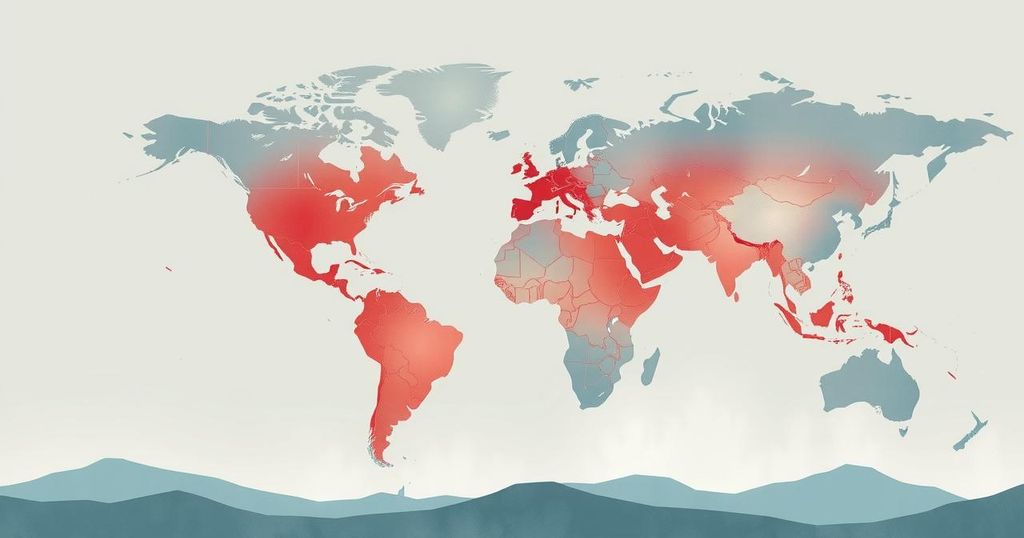Putin’s World Shrinks: Allies Walk Away as Ukraine Conflict Deepens

- The war in Ukraine is causing severe diplomatic losses for Russia.
- Russia sees old allies like Syria and Armenia distancing themselves.
- Finland and Sweden have joined NATO as a reaction to Russia’s aggression.
- Central Asia is drifting from Russian influence toward the West.
- Iran feels abandoned by Russia as military conflicts escalate.
Diplomatic Relations Erode Amid Continued Conflict
The ongoing war in Ukraine, which is now entering its third year, has left not only physical scars on Russia but has also significantly eroded its diplomatic relations. The Kremlin’s former allies are distancing themselves, which is indicative of a broader trend. This situation signifies far more than a mere military setback for Vladimir Putin; it showcases a profound diplomatic collapse reminiscent of the United States’ withdrawal from Afghanistan, albeit under much graver circumstances. The camaraderie that once characterized Russia’s alliances is being replaced by an unsettling silence.
Syria: A Lost Ally Amid Declining Power
Take Syria, for instance—a country that once symbolized a crown jewel for Putin. Back in 2015, Russia’s intervention in the Syrian civil war revitalized Bashar al-Assad, allowing him to regain strength with Russian air support. However, as the conflict has dragged on and Russia’s focus shifted toward Ukraine, the alliance has faltered. Assad’s regime found itself increasingly isolated, with rebel forces resurgent and the Russian military unable to extend its resources to assist. Where once stood a powerful partnership, there is now an unmistakable decline in influence.
Armenia’s Withdrawal Marks a Significant Shift
Armenia is another vivid illustration of this trend. Once dependent on Russia as a frontline defense against Azerbaijani and Turkish aggression, the country has witnessed a staggering shift. After the fall of Nagorno-Karabakh and with insufficient support from Russian peacekeepers, Armenia has since questioned the strength of its alliances. The final indignity came in 2024, when Armenia exited the CSTO, a security pact designed to cement Moscow’s authority in the region. This once-solid partnership now appears to have crumbled under the weight of unmet expectations.
Rising NATO Membership Challenges Russian Influence
The impact of the Ukraine war is not limited to traditional allies; countries like Finland and Sweden have reassessed their postures toward NATO. Initially, Russian aggression was intended to deter NATO expansion, but it has ironically achieved the opposite. Both nations, long associated with neutrality, have opted to pursue NATO membership in the wake of increasing concerns about their security. Their accession to the alliance extends NATO’s perimeter along Russia’s border, triggering alarms in the Kremlin even as the territory it aims to protect continues to dwindle.
Shifting Allegiances in Central Asia
In Central Asia, countries such as Kazakhstan and Uzbekistan are experiencing a geopolitical shift as Moscow’s influence wanes. Formerly strong ties with Russia are now being overshadowed by growing engagement with the West, China, and Turkey. Nations in this region are witnessing the development of new trade routes and partnerships that align themselves more closely with Europe and Asia. Russian leadership, bogged down by its ongoing conflicts, appears oblivious to the subtle but persistent drift away from its historical sphere of influence.
Iran’s Disappointment Highlights One-Sided Alliances
Even Iran, which has provided Russia with military support through drone supplies, finds itself disillusioned. Their alliance, once marked by significant cooperation, has frayed after Moscow’s reluctance to intervene during Israel’s military actions against Tehran. This silence on Russia’s part sends a clear message; Iran’s allies feel abandoned and increasingly question the reciprocity of the relationship. The bloodshed in Iran continues with little to no support from Moscow, prompting questions about the sustainability of the partnership going forward.
An Emerging International Isolation
From the Middle East to Eastern Europe, the story of Russia’s diplomatic landscape is one of stark and heart-wrenching loss. Once a formidable force with numerous alliances, Russia now contends with a landscape filled with vacated seats at the table. The gradual unraveling of its relationships underscores the evolving global dynamics and the isolation that is taking hold. As allies drift away, Russia’s strategic positioning slips further into uncertainty, prompting a dire need for reevaluation of its foreign policies.
A Shrinking Sphere Of Influence
. It is abundantly clear that the ramifications of the Ukraine war extend far beyond the battlefield. They are shaping a diplomatic reality that threatens to confine Russia to an increasingly narrow corner of the global stage. The wonderful world that Putin once navigated is indeed shrinking, leading to a future fraught with challenges.
In summary, the ongoing war in Ukraine is highlighting a significant shift in Russia’s diplomatic landscape, with old alliances crumbling and new partnerships failing to take root. Historical allies like Syria and Armenia are distancing themselves, while even nations like Finland and Sweden are seeking NATO membership out of fear. The resulting isolation presents grave concerns for Russia’s future in global affairs, as the notion of camaraderie vanishes and the call for a reevaluation grows louder.








